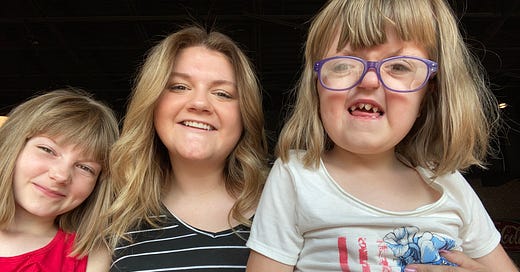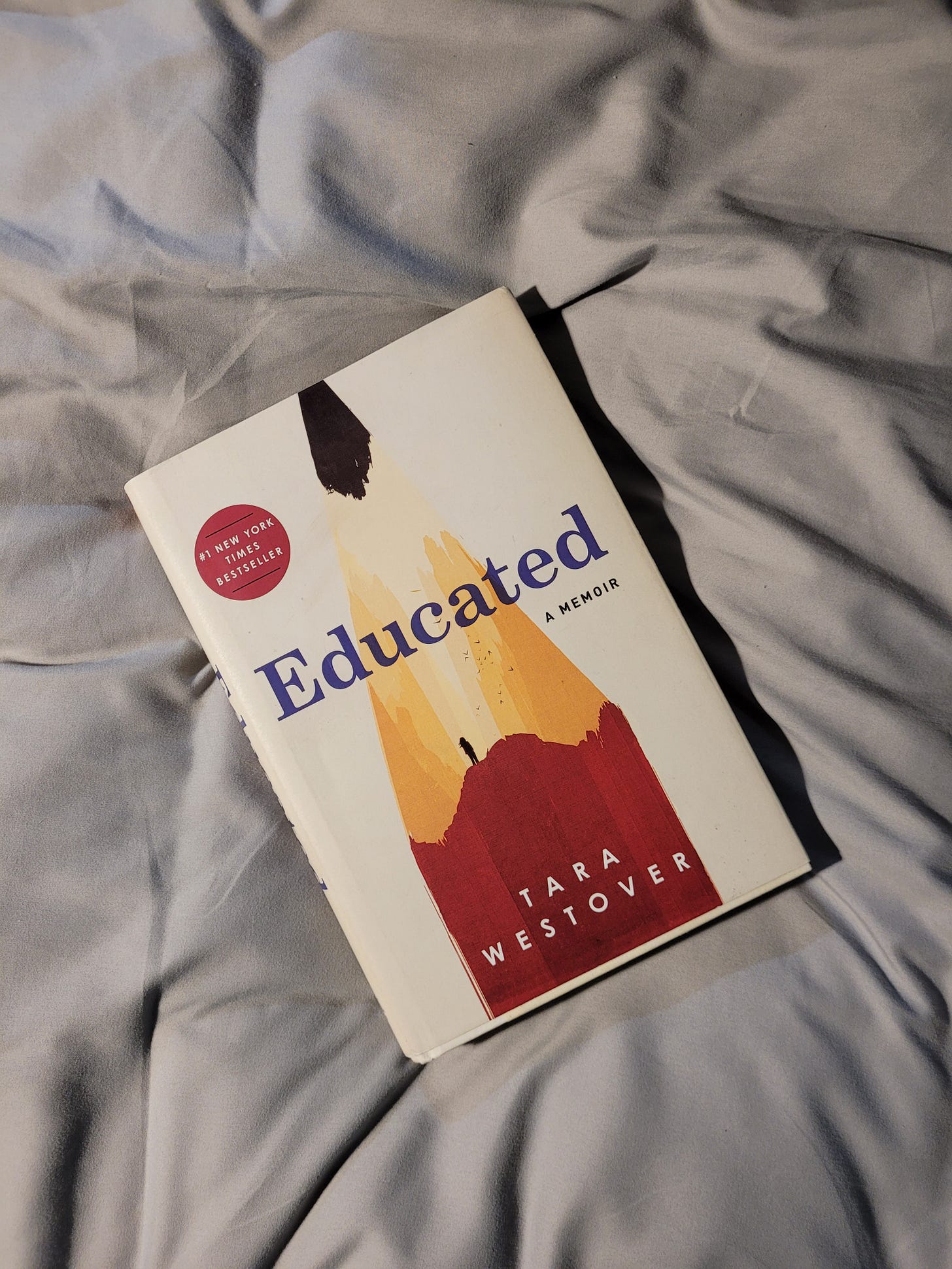"The world can be ugly, but you are not."
Things, and people, become beautiful to us once they are familiar.
I ushered Sarah into the house after a day spent with her best friend, Annie, and Annie’s mom at the local splash pad. She was quieter than usual, subdued. “Did you have fun?” I asked. She paused, then slowly nodded, but I sensed she was unsure. “Is everything okay?”
Sarah said without emotion, “There were some mean boys at the splash pad today. They said I was ugly.”
This is the kind of moment I’d been dreading for Sarah. I’d heard about them from other Apert moms - the stories in which their kids were called monsters or witches because their facial features do not mimic the symmetry of cultural beauty. For eight years, we were fortunate to avoid such encounters, despite occasional gawking and pointing from some.
I put my hands on Sarah’s shoulders before she changed out of her wet pink polka dot suit and locked eyes with hers. “You are not ugly, Sarah,” I told her. “So many people love you. Was Annie with you when this happened?”
Tears formed in her eyes as she said, “Annie told the mean boys, ‘Leave my friend alone!’ And Mrs. Overman told them to go away.”
I hugged her tightly as water pooled around our ankles. “Annie is a true friend, Sarah. Be good to her.”
Without a reply, she waddled into the laundry room to change into dry clothes. It was then when I felt the now-familiar paradox of great sorrow seized with pangs of hope. Sarah has difficulty making friends, not just because of her obvious facial differences, but because she behaves atypically.
Her autistic tendencies often prevent her from engaging in deep connections with her peers. She struggles to identify correct emotional reactions, doesn’t grasp context or nuance, and has no concept of how to move a conversation beyond labored, awkward standards, such as, “What’s your favorite color?” or “Do you like peanut butter and jelly?”
The fact that Sarah has landed a friend who does not pull her along out of pity, but instead genuinely understands Sarah and enjoys her company, relieves me as a mother. But I know that Sarah cannot escape the world and its cruelty. There will be more days like this in the future, more conversations about kindness and beauty, more tears.
As much as that pains me, it also carries a bizarre invitation few families can say happens naturally for them: a chance to model forgiveness, to demonstrate appreciation of diversity in nature and in people, to express softness and compassion, to talk about hard things and hard people and offer ourselves grace.
At dinner, Sarah barely spoke or ate. Finally, I asked her, “Are you sad about what happened at the splash pad today?” I know she isn’t always capable of naming her emotions, of identifying accurately what she feels or why. So I try to help her when I observe her ennui by verbalizing what she cannot: that she might be sad or tired or discouraged, based on the context of the moment. This time I did not have to decipher her mood, because I knew.
She then wept. It was what some might call an ugly cry - no warning, no precursor, no red eyes or quivering lip, just heavy sobs and loud heaves with her family around the table. This was an outpouring of a deeper pain than I’d witnessed before, and I knew she connected what happened earlier that day with her self-perception, her identity.
“I am ugly!” she cried. Alayna, our summer nanny at the time, leaned over, wiped a tear from Sarah’s face, and said softly, “The world is ugly, Sarah. But you are not.”
Wise words from a young woman to my daughter. I could not have said anything more apt, more succinct than this. Sarah was surrounded by those who love her most, and she felt safe enough to be vulnerable in that shared space and time. Felicity and Veronica rallied around her, offering hugs and words of comfort. I said, “See how loved you are, Sarah?” She nodded, leaned into her sisters’ embraces, and finally inhaled long and slow.
That was two summers ago, and I’ve often thought about how ugly the world can be, but also how beautiful. The paradigm of beauty (in my perception) has morphed from that which is complete, perfect, and uniform into the quirks, eccentricities, and outliers found in the world, mostly in nature.
The irregular patterns and shapes of trees and foliage catch me by surprise, because they stand out from the congruity of their surroundings: the ancient maple in our front yard with a curved trunk, the ladybug with asymmetrical dots lining her wings who buzzes around my vegetable garden, the spontaneous hybrid day lily that crossbred with a nearby daffodil.
In turn, I am caught off guard by the delight in which I am enveloped by their uniqueness. I've always found the stragglers, outliers, and anomalies captivating. Beautiful.
Most people are not drawn to Sarah because of gorgeous eyes or stunning lips or smooth skin. She has none of these features. Her countenance can be startling, I know, because it took me a long while to look at my own daughter during her infancy without cringing or crying. And I hated myself for it at the time, but I’d never seen anyone with bulging eyes, a protruding forehead, and scrunched nose before I held her in my arms.
Things, and people, become beautiful to us once they are familiar. I’ve always said we fear what we don’t understand. Maybe this is why I’ve learned to live in the gray rather than in careful compartments of this or that, good or bad, beautiful or ugly. It’s because of raising a daughter like Sarah and what she has taught me about life, about love, about humanity. About the prejudices we all harbor but seldom admit. About the growth that is possible when we step beyond what is familiar and instead learn to sit with our discomfort until we can hold a space for it.
I have seldom been comfortable these past ten years. Venturing into public with Sarah has gotten easier for me now than it was those first weeks after her birth, but Sarah seems more insecure the older she gets, the more she recognizes a stranger's stare means she looks different. In fact, life will become harder as time progresses. Her humanity is worn on her face, but mine can be concealed. I can hide my brokenness, but she cannot. What she will suffer I cannot determine, but I know it will contain both the beauty and the ugliness of the world, both the Annies and Alaynas, and the mean boys at the splash pad.
All of us germinate seeds of kindness and seeds of judgment inside of us. What we sow is what we choose to do with the admission of our own faults, the times we have been cruel, or ostracized or condemned someone out of spite or jealousy or exhaustion. Honesty begets humility, and humility is the fertile ground upon which love and compassion and tenderness can flower in our lives.
What I’m currently reading:
I know I’m late to the game with this one, but when you are an avid reader and literally have a list of 200 books in your library queue, plus another 150+ on your Kindle, and dozens lining your bookshelf, well, it takes a while.
Educated was not what I expected. Tara Westover is probably the most transparent memoirist I’ve ever read. She includes many footnotes of her personal memories, in which she discloses the discrepancies between her memory and that of one or several of her siblings. It’s evident that she investigated what she thought, what she believed, how she was raised.
She is careful not to pass judgment on anyone in her story, except herself. That is no small feat for a memoirist who is recounting physical and psychological abuse, plus educational neglect and severe religious indoctrination. But she did it. And she did it courageously.
I have watched a couple of interviews with Westover, who thoughtfully shares that she believes her parents loved her, that they did the best they could. This is an incredible act of kindness and generosity on her part, and demonstrates her personal integrity.
If you haven’t read it, it’s gritty and, at times, very disturbing, but challenging and well written.
If you have read it, what did you think? I’d love to hear your thoughts in the comments below.







Beautifully written! Such hard things to weigh through and make sense of. You are the best mom for your daughter. She is blessed to have a mom who understands her so well.
Beautiful essay, Jeannie! Your summer nanny is pure gold. The world is ugly in so many ways, but like you point out there's beauty, too. You are doing your best to be a great mom, which I have realized that, based on my experience, is the hardest job in the world. I'm glad Sarah has such a great friend and a great family!